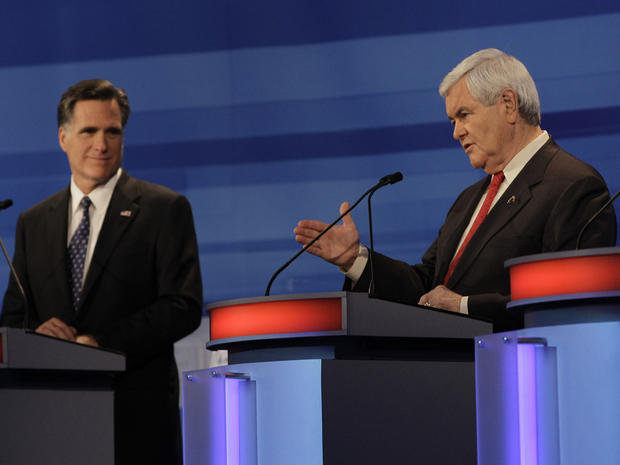Romney-Gingrich super PAC spat highlights hazy rules
A day after he condemned current campaign finance regulations for making "a mockery of our political campaign season," Mitt Romney appeared to change his tune on Wednesday morning after Newt Gingrich publicly called on him to disavow a negative ad campaign being run by an outside group promoting Romney's candidacy.
"This is politics," Romney said on Fox News. "If you can't stand the heat in this little kitchen, wait until Obama comes after you with a Hell's Kitchen."
Romney's latest jab at Gingrich comes amid a series of heated exchanges between the two camps and highlights the murkiness of the laws that govern campaigns' relationships with the super PACs they established to support their candidacies.
Restore Our Future -- which is allowed to accept unlimited contributions and is being run by Romney's former aides -- has been blanketing Iowa's airwaves with negative TV ads targeting Gingrich, spending over $700,000 this week alone in the nation's first voting state, according to National Journal.
The ads appear to be having an effect in conjunction with other anti-Gingrich spots aired by the Rick Perry and Ron Paul camps, as the former House speaker has lost his lead in recent Iowa polls.
During a campaign stop in the southeast Iowa town of Oskaloosa on Wednesday, Gingrich challenged Romney to ask publicly that Restore Our Future ease its negative advertising blitz.
"We ought to understand these are his people, running his ads, doing his dirty work while he pretends to be above it," Gingrich said.
Gingrich has vowed to condemn and disassociate himself from any negative advertising that an outside group produces on his behalf.
However, a pro-Gingrich super PAC, Winning Our Future, recently hired former Gingrich spokesman Rick Tyler as its chief strategist, and Tyler told the Washington Post that his group plans to air ads contrasting Gingrich's record with those of his opponents.
On Wednesday, Romney backed down from an earlier comment in which he said he could go to jail if he communicated with the super PAC "in any way, shape, or form." He now concedes that he could ask the group to take down the negative ads without risking prosecution.
Campaign finance experts had pounced on Romney's suggestion that he was barred from requesting that Restore Our Future stop its negative campaigning or encouraging his supporters not to donate to the group.
"Romney's comment itself is absurd," said Paul Ryan of the Campaign Legal Center, a nonpartisan group that analyzes election law and promotes transparency. "I think Mitt Romney has engaged in a lot of hyperbole when he implies or explicitly states that he can be criminally prosecuted for coordinating in any way with a super PAC. That's just not the case under the law."
Though the Federal Election Commission has established a thick wall that bars coordination between campaigns and super PACs on expenditures, Ryan noted that the legal constraints covering other forms of interaction are "fairly modest in some respects."
For instance, Romney took advantage of a June FEC ruling that allowed him to speak at Restore Our Future fundraisers as long as he did not personally solicit money for the super PAC.
Speaking on the condition of anonymity, one Romney aide told RCP that the former Massachusetts governor is "working within the system as it exists, even as he believes the current rules don't make any sense."
Appearing Wednesday on MSNBC, Romney seemed to suggest that campaigns should be allowed to raise unlimited funds directly from individuals. "We really ought to let campaigns raise the money they need and just get rid of these super PACs," he said.
The aide declined to say explicitly whether Romney in fact favors unlimited individual contributions, or if he would make campaign finance reform a priority as president.
Fred Wertheimer of Democracy 21, a campaign finance watchdog group that is considering a court challenge to the legality of super PACs, called Romney's comments "wrong on two fronts."
"First of all, he's complaining about super PACs while he is allowing them to play a central role in helping his campaign," Wertheimer said. "Secondly, his solution to the super PAC problem appears to involve setting up a system of pure legalized corruption, in which donors can directly buy results from federal office holders."
Ron Paul, Rick Perry and Rick Santorum also have super PACs backing their respective campaigns and all have been airing TV ads in Iowa.
Priorities USA -- a super PAC founded by former White House aides to President Obama -- in November launched a six-figure online ad blitz targeting Romney.
Former deputy White House press secretary Bill Burton, who co-founded the group, has said the group was created to fight a "double standard" by which Republicans previously held an advantage in outside spending.
"I would be one of the folks who said that there is too much money in politics, and that these rules are no way to run a democracy," Burton told NPR in October. "But we didn't make the rules. We don't like the rules. But the only way you change the rules is if you get control of the system.


